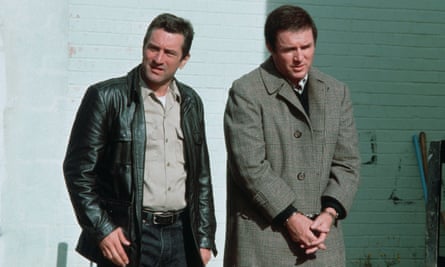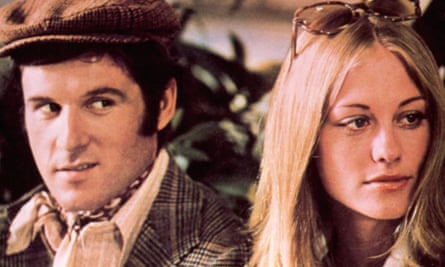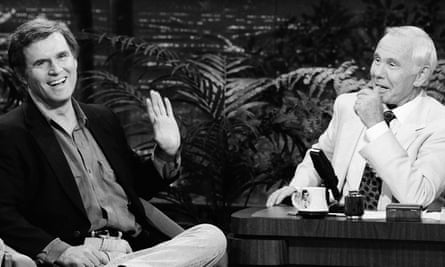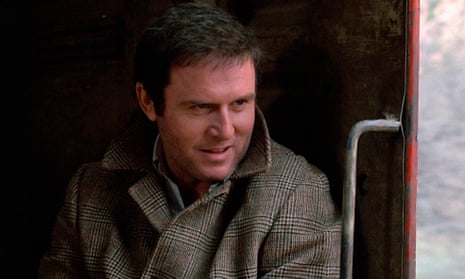The actor Charles Grodin, who has died aged 86, was never really a star, though he might have been, had he not turned down the lead in The Graduate. He was also too well-defined a presence to slip between roles without bringing his own baggage along. He cultivated a persona through which resentment and superiority were conveyed with calm understatement. Grodin would seem urbane at first, but the joke lay in how quietly rattled and rancorous he would then become. His gaze was flat and pitiless, his mouth a straight horizontal line. When a smile did come, it was impatient or insincere. He never looked impressed.
In his greatest performance, as a man who falls for another woman while on his honeymoon, in The Heartbreak Kid (1972), he was conniving and cruel, turning courtship into a bloodsport. The comic thriller Midnight Run (1988) was a late highlight that came long after Grodin might have been expected to land a leading role. He was 52 at the time and beat Robin Williams to the part of the gentle mafia accountant escorted across the US by a bounty hunter played by Robert De Niro. Their chemistry, and the novelty of seeing Grodin strike tender notes, helped make the film a joy.
Born in Pittsburgh, Pennsylvania, he was the younger of two sons. His father, Theodore, sold wholesale supplies from his store, which was called the Grodin Company despite having a staff of only two – Grodin’s mother, Lena (nee Singer), also worked there. Grodin studied acting at the University of Miami but left without graduating and won a scholarship at the Pittsburgh Playhouse School. He next moved to New York and enrolled at the Actors Studio while working as a cab driver and security guard. He began to get small parts in theatre and television and became an assistant to the director Gene Saks.

In 1965, he made his Broadway debut in Tchin, Tchin, starring Anthony Quinn. Among later theatrical successes was the original 1975 production of Same Time, Next Year opposite Ellen Burstyn. Grodin’s own plays include Hooray! It’s a Glorious Day … And All That (1967), a satire on Broadway musicals that he co-wrote and directed, and The Right Kind of People (2004), a comedy about the board of a Manhattan housing co-operative.
After starring for six months in the TV soap The Young Marrieds, Grodin became a writer on Candid Camera, in which members of the public were drawn unwittingly into pranks. When the offer came in 1967 for the lead in The Graduate, he balked at the low fee – $500 a week, which compared poorly with the $1,000 he was getting as guest star on the western series The Guns of Will Sonnett – and turned it down. The fee was raised but Grodin lost the part after being uncooperative in his screen test.
He worked with the film’s director, Mike Nichols, soon after on Catch-22 (1970), and became friends with the musician Art Garfunkel, one of his co-stars. Grodin wrote and directed a Simon & Garfunkel TV special; his radical idea was to introduce into that cosy television convention some political discord. Beginning with the duo singing America, he cut from images of rural beauty to footage of violent riots and anti-Vietnam protests. The sponsor AT&T removed its name from the programme and it became one of the lowest-rated entertainment specials in TV history.

Grodin had a small part as Mia Farrow’s kindly obstetrician in the horror film Rosemary’s Baby (1968). The Heartbreak Kid briefly made him a star of sorts. He said he had “no personal relationship at all” with his colleague Cybill Shepherd, while the screenwriter, Neil Simon, wanted to fire him. Grodin also became worried about being replaced after seeing Hoffman near the set. But his complex, discomfiting performance proved to be a masterclass in the comedy of embarrassment. The film’s director, Elaine May, later cast him as a CIA agent in her 1987 satire Ishtar.
Any commercial lustre Grodin had was squandered by the failure of his follow-up, 11 Harrowhouse (1974), in which he played a jewel thief; the film was widely panned. “Nobody wanted me,” he said. “All calls stopped immediately.” He was the villain in a new version of King Kong (1976), a dissatisfied school principal in the romantic comedy Thieves (1977) and a scheming secretary in Warren Beatty’s Heaven Can Wait (1978).
He had also become known for his playfully spiky chatshow appearances. Johnny Carson liked him so much that he put Grodin under contract as a guest in 1973. He would appear once a month, to the exclusion of all other talk shows. Their imitation of mutual hostility was so convincing that the programme always received letters of complaint about Grodin’s shabby treatment of his host.
“Look at you,” he sneered on one show. “You don’t really care what I have to say, do you?” Carson replied: “No. I gotta do an hour a night. I’m looking for warm bodies, that’s all.” Difficult truths about the chatshow format were drawn out in these exchanges like poison from a wound.

He continued in this vein for years, transferring his act to Late Night with David Letterman, where he would usually begin by ignoring the presenter before taunting him. Grodin told Letterman that his shtick originated when he appeared on Carson’s show straight after a medley by Diana Ross of her greatest hits. Not knowing how to follow that, he went to the other extreme and affected disdain. “I haven’t stopped doing it,” he said. “I’m doing it right now.”
Subsequent films included another Neil Simon comedy, Seems Like Old Times (1980), The Great Muppet Caper (1981), in which he had a love scene with Miss Piggy, and The Lonely Guy (1983) with Steve Martin. He was in Beethoven (1992) and Beethoven’s 2nd (1993), the hit family comedies about a troublesome St Bernard dog, and played the accountant to a man impersonating the president in Dave (1993).
Grodin had his own popular radio talkshow in the mid-1990s and also became a commentator on the political TV show 60 Minutes II. He was the author of several books, including a memoir, It Would Be So Nice If You Weren’t Here: My Journey Through Show-Business (1989). His acting appearances became rarer in recent years. He played a veteran documentary maker in the comedy While We’re Young (2014) starring Ben Stiller (who had played Grodin’s role in a remake of The Heartbreak Kid). He was memorable as a doleful, philosophical doctor with a three-legged dog in the comedian Louis CK’s unorthodox sitcom Louie (2014).
He is survived by his second wife, Elissa Durwood, whom he married in 1983, and their son, Nicholas; and by his daughter, Marion, from his first marriage, to Julie Ferguson, which ended in divorce.

Comments (…)
Sign in or create your Guardian account to join the discussion